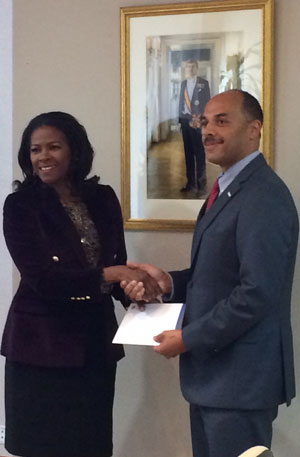 PHILIPSBURG:--- The final report "Baseline Study on Institutional Integrity Management" was presented to the president of Parliament, drs. Gractia Arrindell, on Wednesday April 16th 2014 by the chairman of the General Audit Chamber, Mr. Ronald Halman. The Baseline Study provides the state of affairs with regard to laws and regulations related to (aspects of) integrity.
PHILIPSBURG:--- The final report "Baseline Study on Institutional Integrity Management" was presented to the president of Parliament, drs. Gractia Arrindell, on Wednesday April 16th 2014 by the chairman of the General Audit Chamber, Mr. Ronald Halman. The Baseline Study provides the state of affairs with regard to laws and regulations related to (aspects of) integrity.
The General Audit Chamber decided to conduct the baseline study in order to provide a contribution to the topic of integrity and to draw attention for the creation of a preventative integrity policy, along with the development of a thorough system of integrity management. The study was started late in 2013 and completed in March 2014. The General Audit Chamber is authorized to conduct investigations on integrity on the basis of article 33 of the National Ordinance General Audit Chamber.
According to the report, "Integrity is a prerequisite for confidence in government". The General Audit Chamber considers integrity, along with effectiveness, efficiency and a customer orientation, to be essential prerequisites for good governance. Together, these factors determine the quality of the government organization.
With the Baseline Study, the General Audit Chamber sought to answer a number of questions among which, the extent of compliance with article 101 of the Constitution. This constitutional stipulation calls for additional regulations relating to the management of integrity. Furthermore, the baseline study seeks to determine the extent to which government complies with the requirements (as stipulated by law) to further develop certain aspects of integrity, to develop (integrity) norms in national decrees containing general measures, and to issue ministerial regulations etc. The General Audit Chamber also reviewed whether the rules and regulations related to integrity are actually executed and enforced.
As a framework, the General Audit Chamber developed an inventory of all published laws (national ordinances) related to (aspects) of integrity since October 10, 2010. The inventory was developed per institution of government (Parliament, Council of Ministers, Ministries, Police, and High Councils of State). As part of the research, the General Audit Chamber surveyed and interviewed representatives of the various institutions.
A main finding of the study is that the basic "infrastructure" of organic legislation related to integrity management is in order. However, few, if any formal regulations in the area of integrity are being implemented. Moreover, almost none of the additional rules and regulations containing specific norms that are required (in the form of ordinances) exist.
The report also contains findings specific to the various institutions studied. For example, mention is made of a backlog in the number of civil servants that have not yet taken the oath of office. In addition, the frequent exceptions to public tendering of works and projects was reviewed.
The General Audit Chamber recommends among others, "fast tracking" the execution of all ordinances related to integrity, for example, by means of a technical task force assigned the job of drafting legislation.
Furthermore, the General Audit Chamber suggests that Codes of Conduct should be developed for both Parliament and Government. The Code of Conduct for Civil Servants needs to be reviewed and provided with a "status", for example, by enacting the Code by means of a Ministerial Decree or a National Decree.
A campaign is recommended to eliminate the backlog of civil servants who have not yet taken the oath of office. The Audit Chamber also recommends prioritizing the development of the additional rules for public bidding (tendering) given the vulnerability related to granting of contracts for works and services.
The report is extensive and outlines many other aspects of integrity, and provides additional findings related to the existence and enforcement of integrity rules. Recommendations are issued as part of the report as well.
The Baseline Study is published in both English and Dutch and is available on the website of the General Audit Chamber (www.arsxm.org).












